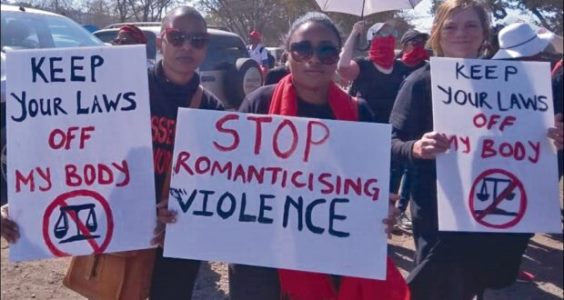
November 25th marked the beginning of the annual international 16 Days of Activism Against Gender-Based Violence. This year it takes place against the backdrop of a global pandemic that has exacerbated the situation and magnified the need for a fightback.
The already pre-existing pandemic of violence against women – with 1 in 3 women globally having experienced physical or sexual violence – has increased even further.
Since March, and the beginning of lockdown in the UK, five women have been killed every week by their abusers, more than double the rate previously reported. There has been a huge surge in the numbers of women phoning helplines or looking online for support.
In Scotland, where the Domestic Abuse (Scotland) Act, which criminalised coercive and controlling behavior, was introduced last year, there have been 774 offences recorded in the first half of this year. Seven hundred and twenty four of the victims were women. Most domestic violence goes unreported so the figures are probably, in reality, much higher.
These horrifying figures set the scene for women entering the pandemic both economically and socially disadvantaged and created the conditions for domestic violence to flourish in an environment where women felt hopeless and trapped.
In the current job slaughter, women have been one and a half times more likely to have lost their jobs or been furloughed and are 50% more likely to have had their hours cut.
Women’s poverty and violence is inextricably linked to child poverty. As women tend to attempt to shield their children from the worst aspects of their abuse they often go without food and clothing and suffer the intolerable toll this has on their mental health.
Cuts to women’s refuges and legal aid make it almost impossible for women to leave these abusive relationships.
Over a decade of cuts and privatisation of the NHS has left it struggling to cope during the pandemic with anything much other than covid related issues. With 1 in 4 waiting three months or more for help, mental health is most certainly at the back of the queue.
The Scottish government has responded to this rise in domestic abuse by releasing £4.2 million in funds to councils and various organisations, like Women’s Aid. However, 79% of its services either received no increase in funding or have been cut by, on average, 10% prior to the pandemic. This money will struggle to meet the huge increase in demand.
Decade of austerity
Working-class women, pre-covid, were already experiencing the brutal backhand of over a decade of austerity, a policy rooted firmly in oppression and inequality.
Women’s services, always on the frontline for budget cuts, have been decimated since the Tories came into power in 2010. In Scotland under the SNP government, the picture is very similar.
Although over 72% of women are now part of the workforce in the UK, they comprise the majority of low paid, undervalued work.
Women are paid, on average, 15% less than men per hour. Women still carry the double burden of working and taking care of the home and children and they are often forced into lower-skilled, part-time work on return from maternity leave. Around 42% of women work part-time and 55% are on zero-hours contracts.
Women are also twice as likely to rely on benefits as men and have been disproportionately affected by the Tories cruel benefit reforms. The draconian two-child limit and its vicious rape clause have plunged women further into poverty.
Introduced in 2017, it has since forced over 900 women in the UK to reveal humiliating and traumatising details of children being born under “non-consensual conception” in order to receive benefits for that child. Almost 1 million other “third” children are now without any financial support, causing untold misery for women and their families.
Women are also far more likely to give up paid employment to look after children, elderly or sick relatives, and the carer allowance they receive is currently set at the lowest rate for any benefit. Women provide 70% of unpaid care in Scotland, and across the UK £1 billion has been slashed from carers’ incomes in the period of 2011-2018.
One in four women reports experiencing violent attacks from current or ex-partners and financial abuse is often part of the coercive control exerted by abusive men. Universal Credit facilitates this coercion with its payment to one party of a couple.
What’s socialism got to do with it?
It’s clear that the capitalist system is incapable of delivering equality because it lives and breathes inequality! Gender-based violence, sexism, and the oppression of women are rooted in the DNA of this capitalist patriarchal system.
A socialist society would end gender-based oppression and would be based on democratic public ownership, where society’s resources can be harnessed to meet the needs of all.
We would, on the basis of socialism, begin to see the overcoming of all kinds of oppression, creating the basis for new non-exploitative human relations.
To achieve it requires a united struggle of working-class people, young people, and the oppressed.
